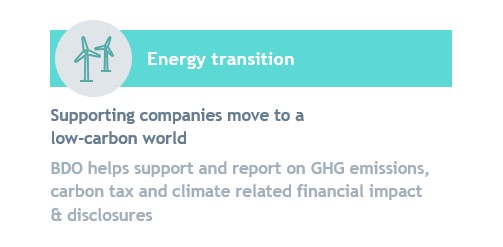Energy & Utilities
Like the air we breathe, water and energy are vital assets. And today, more than ever, they are critical cost items for any organisation whether you are a utility company or a consumer. The European Green Deal sets the transition to a carbon-free energy sector as an irreversible goal, which will thoroughly reshape the landscape of the utility sector. Anyone who does not use the available energy sources in a sustainable way in the 21stst century will sooner or later have to foot the bill. The good news: those who do pursue a sustainable energy policy have a - big - head start on their competitors.

Beneficial for profit and environment
Every company, whether large or small, private or public, has a social responsibility to rethink its business model, in the interest of the planet, society and its own future relevance in the market. Linear becomes circular, product becomes service, ownership becomes sharing economy, ...
At the same time, as an entrepreneur, you have to keep the shareholders satisfied in the short term - read: keep the results up. Strategically reconciling both goals is not easy, but it is a necessary task.
The most sustainable and profitable energy strategy is based on limiting internal energy demand. Maximising the use of renewable and locally generated energy from the sun, wind, ground heat and residual energy from production processes helps to reduce CO2 emissions An energy transition plan and clear and quantified energy targets give direction to how a company uses residual energy and makes optimal use of fossil fuels. Net zero or even negative CO2 targets are often achievable!
Therefore, consider sustainable energy less as a cost item and rather as a driver for future-proof investments and growth opportunities. Moreover, energy and environment & climate act as communicating vessels. Sustainable or renewable energy use reduces the ecological footprint and has a (in)direct positive influence on the climate evolution. And nobody would be against that, right?
What are you looking for?
How do you translate such a strategy into concrete data, figures, actions and results? Even if your questions are diverse, our experts will work with you in a pragmatic manner to find concrete answers. Here are a few examples:
- How do you reduce CO2 emissions through investments in renewable energy?Together, we develop the financial business case that maps out the 'Total Cost of Ownership' and examines alternative financing structures, such as ESCO (Energy Service Companies), project financing or leasing.
- Can electric and hydrogen charging infrastructure for commercial vehicles provide a revenue model? What are the advantages and disadvantages of the different models (concession, purchase, charging station-as-a-service)? Is financing via project or investment credits, leasing or other 'asset based' financing techniques appropriate? We will calculate the various options together.
- How can a city or a municipality align its energy policy with the sustainable development goals (the so-called SDGs)? Our experts, together with climate experts and consulting firms (for a.o. the European Bank for Reconstruction and Development), work out a detailed Green City Action Plan. The social cost-benefit analysis shows the affordability, financeability and financial impact of such investments on the long-term budget.
Data, IT-driven and multidisciplinary
Measuring brings knowledge. We know, it's a dead giveaway, but data and reports are extremely valuable for steering, adjusting and evaluating activities. To predict or optimise returns, for example, or to gain insight into the balance between production and consumption. And to be compliant with the increasingly complex regulations, such as the European Directive on Corporate Sustainability Reporting (mandatory reporting of non-financial data, including the carbon footprint).
Accurate and correct data collection and analysis require intelligent organisation and thorough integration of processes within a digital environment, as well as a flexible IT architecture, in line with the processes and where applications can be updated and integrated smoothly (in the event of takeovers, for example) that also enables connection to external networks or platforms in order to exchange data or control production. And all this within a cyber-secure environment.
Whatever your question or specific need, you can count on our multidisciplinary team to understand your objectives and your operational, digital, financial, tax, legal, sustainability and strategic challenges. They combine that knowledge with best practices and experience in the field, nationally and internationally. What’s more, thanks to our global network, they can call on the knowledge and experience of nearly 170 countries at any time.